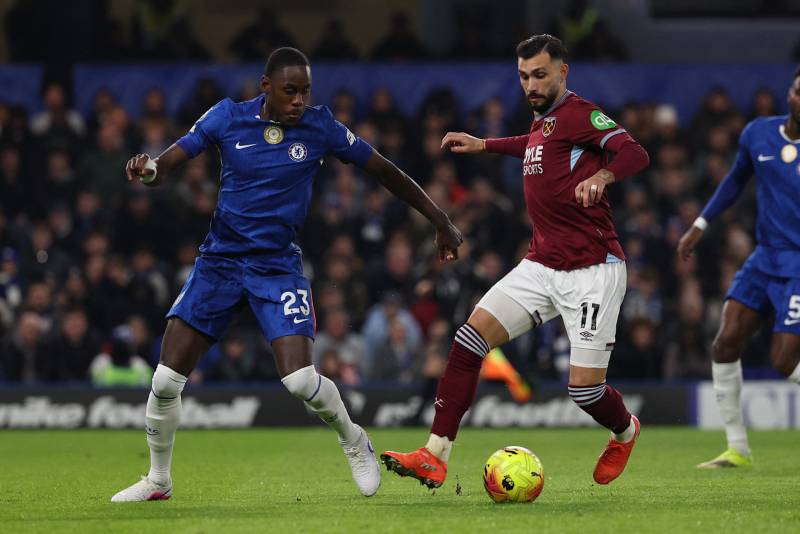Fikayo Tomori’s move from Chelsea to AC Milan at the beginning of the season was the latest in a long list of young English footballers to seek opportunities abroad for the good of their career. In the aftermath of recent success stories from the likes of Jadon Sancho and Jude Bellingham, the 24 year old opted to turn his loan move at the San Siro into a permanent deal with the Italian side paying £25 million GBP (approximately $32 million USD) for his services.
“I honestly don’t know why it’s taken so long for players to think about moving abroad,” Tomori tells HYPEBEAST. “Over the last few years especially, I think players have finally started to realise there are other ways to make a name for themselves away from the Premier League.”
Despite the defender’s rise in Serie A, it was the Premier League which initially saw Tomori impress. Born in Calgary, Canada, the defender moved to South East London just shy of his first birthday, before joining the Chelsea Academy seven years later. After making his professional debut in the final game of the 2015/16 campaign, Tomori was later loaned to Brighton, Hull City and Derby County (where he was named Player of the Season), before returning to Chelsea under the leadership of then-manager Frank Lampard. Despite a bright start, Tomori was soon forced to look overseas for first-team opportunities, but just two seasons and a permanent deal later, he hasn’t looked back.
“For me, moving to Milan was actually a pretty easy decision,” he explains. “As English players there’s always a market for us in the English leagues, but for me personally the opportunity to come to Milan, learn something different and come at football from a different angle was something so unique and something that can only help our national game as a whole”.
Since his arrival, Tomori has become one of the first names on the team sheet and perfectly embodies the type of young, dynamic player head coach Stefano Pioli looks for in his aggressive style of play. As the club looks to claim its first piece of silverware since the 2010–11 season, AC Milan finds itself at the Serie A summit with only five games remaining. While the team has undoubtedly improved over the past 12 months under Pioli’s tenure, Tomori believes his game has come on leaps and bounds too.
“I’m definitely more aware of where I am on the pitch and where I should be in relation to the ball,” he explains of his progression. “I’ve learned that defending is not just about tackling, but about being aware and being in the right place at the right time. I’m always learning, but there are still parts of my game I know I need to improve on, but it will happen, I’m sure.”
Tomori’s introduction to Italian football was somewhat diluted as a result of the COVID-19 pandemic. Initially joining on-loan from Chelsea in 2021, the defender began life in Italy playing behind closed doors and was confined to certain locations. Describing his Italian as “pretty good”, Tomori admitted it gave him time to focus on training and learn the language, but even behind the constraints of the pandemic, the importance of football throughout the country has always been more than apparent.
“I remember last year when we played Juventus in the league, there were going to be no fans in the stadium because of COVID,” he recalls. “But when we left on the coach from our training ground on the morning of the game, there were thousands and thousands of people outside banging on the bus and having a party — that’s something you don’t really get in England. That was the first time the importance of football in Italy really hit me. It’s more like a religion.”
While young Englishmen plying their trade abroad seems common practice in 2022, it’s something of a more recent revelation. England winger Sancho is arguably one of the catalysts for the recent rise following his success at Borussia Dortmund before a move to Manchester United last year, while the likes of Bellingham, Tammy Abraham and Ainsley Maitland-Niles continue to impress overseas. While the Premier League remains arguably the most competitive league globally, Tomori believes these varied experiences both on and off the pitch can only be a good thing for English football.
“The way football is played differs from country to country, so learning various aspects of the game is only a good thing for our game,” he explains. “It gives players different attributes they may not have had before and develop parts of their own game they may not have known they had. In Italy things are a bit more tactical and it’s more about positioning, whereas in the Premier League it’s faster-paced and you need to be stronger. It’s about developing parts of your game you might not have if they had stayed in England.”
Unlike other players who have moved abroad in recent years, Tomori currently has no desire to return to the Premier League anytime soon. “Moving to Milan has not only helped my game, but I learned a new language, it made me mature and gave me new experiences,” he says. “I’m enjoying Milan right now and our goal is to win something. For now I just want to keep playing, keep doing my best for Milan, try and win some trophies. Hopefully that could lead to a World Cup call-up, who knows?”




